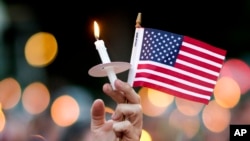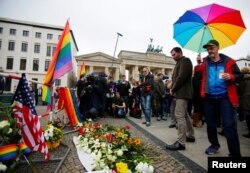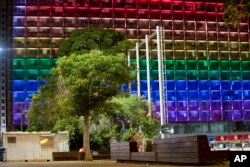Calls for Muslims to be banned from U.S. entry as a result of the Orlando mass shooter's claim of allegiance to Islamic State could strain U.S. relations with allies in Muslim-majority nations, said an official with the largest Muslim civil liberties group in the U.S.
"Whenever you have a situation where allies are concerned about possible reckless behavior if someone gets into the White House, I think that can only harm our relations with the rest of the world," said Ibrahim Hooper, national spokesman for the Council on American-Islamic Relations (CAIR).
His comments came Monday after presumptive Republican presidential nominee Donald Trump repeated a call for a temporary ban on Muslim immigration to the U.S., following Sunday's massacre at a Florida nightclub with a predominately gay clientele.
Authorities say Omar Saddiqui Mateen, an American Muslim born to Afghan parents, declared loyalty to Islamic State and its leader, Abu Bakr al-Baghdadi, as he opened fire in Orlando, killing at least 49 people.
Trump's call for the ban has received wide criticism, including from Democratic rival Hillary Clinton's camp, which accused him of "political attacks."
Support for ban
However, his call to curtail Muslim entry has received some support.
"We need to halt Muslim immigration until the jihad threat is resolved, or Americans will be killed at home by Muslim terrorists," said Karin McQuillan in an article for American Thinker, an internet publication.
It also comes at a time when some U.S. lawmakers have raised concerns about an alleged Saudi connection to extremism, as a bill that would open the door for September 11, 2001, terror attack victims to sue the Saudi government makes its way through Congress.
In a May hearing, Congressman Brad Sherman questioned if there was a link between terrorism and the Saudi government's support for Wahhabism, an ultra-conservative interpretation of Islam.
"What concerns me," said Sherman, is the Saudi government is seeking protection from legislation that could expose it to lawsuits while "defending every day the Wahhabi mullahs who not only preach orthodox practices of Islam but preach violence and murder against those whom they disagree with."
Said Hooper: "Our government is doing what it can to mitigate the damage from this well-coordinated and well-financed Islamophobia industry in our nation. But there is only so much you can do."
The State Department said more than 50 countries and leaders had expressed solidarity and condolences in the wake of Sunday's mass shooting.
Bigotry and IS
In a Monday appearance, Secretary of State John Kerry said the worst thing that could be done was to "engage in trying to point fingers at one group or one form of sectarianism or another, or one division or another."
Shaarik Zafar, the State Department's special representative to Muslim communities, told VOA that in his travels abroad he is often asked about his perception of anti-Muslim sentiment in the U.S.
"I generally respond by acknowledging that while bigotry and discrimination are unfortunate occurrences in every corner of the globe, including the United States, such intolerance does not accurately portray our country," he said.
Counterterrorism expert Malcolm Nance said bigotry toward Muslims could inadvertently help extremist groups.
"Rampant Islamophobia is ISIS' greatest weapon," said Nance, who heads the Terror Asymmetrics Project.
In addition to aggressive law enforcement, one of the best things that U.S. leaders can do is to avoid "demonizing" Muslim Americans, said Brookings Institution Middle East analyst Daniel Byman.
"Even as we mourn the tragic deaths of so many of our countrymen," he said, the U.S. must ensure that "someone like Mateen is portrayed as hateful and pathetic, not as a representative of a broader threat among American Muslims."















